The intersection of entrepreneurship, U.S. foreign policy, international development and Latin America will be the subject of a talk by a senior Defense Department official at 5 p.m. Thursday, Nov. 30 in Room 2240 at the Ross School of Business. The discussion, which is free and open to the public, is co-sponsored by WDI and the LSA Center for Latin American and Caribbean Studies (LACS).
The talk by Lt. Col. Eldridge Singleton, a senior official and attache with the U.S. Dept. of Defense, is titled, “The Role of International Development and Entrepreneurship on U.S. Foreign Policy in Latin America.”

Lt. Col. Eldridge Singleton
Singleton will discuss U.S. foreign policy in Latin America, the country’s foreign trade policy and the United Nations’ approach to international development, and how these affect entrepreneurs looking to establish themselves in the region and what challenges they might encounter.
Before his current role, Singleton served as the U.S. Army Attaché to Bolivia from 2015-17, Acting Defense Attaché to Jamaica in 2016, and Operations Officer and Army Section Chief for the Security Cooperation Office of the U.S. Embassy in Port-au-Prince, Haiti from 2013-15. He also served in several command and staff positions in the United States, the Middle East, and Latin America, including operations to combat terrorism. After multiple combat tours, he transitioned to a career as a multilingual U.S. Army Foreign Area Officer.
Singleton has been recognized for his work, including four Bronze Star Medals for heroic service in combat, a Defense Meritorious Service Medal for interagency service overseas, an Army Commendation Medal with “V” device for valor in combat, and the Department of State’s Meritorious Honor Award.
He received his bachelor’s degree and awarded commission in the U.S. Army as a Second Lieutenant Infantry Officer at the United States Military Academy at West Point. He also holds a master’s degree in Latin American Studies from San Diego State University.
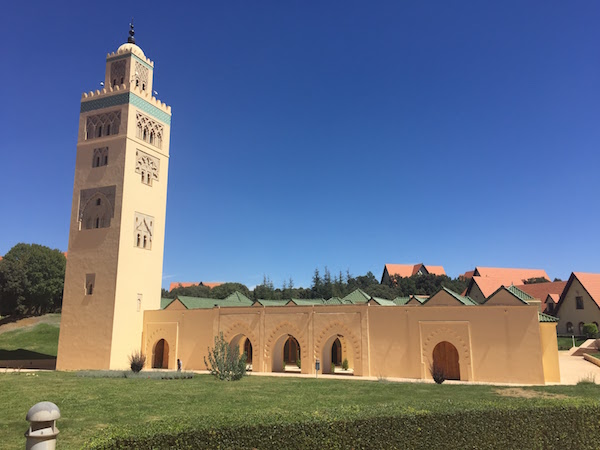
Al Akhawayn University in Morocco, one of the organizations participating in the M2GATE project. (Image by Meghan Neuhaus/WDI)
WDI has been selected by the Stevens Initiative to run an exciting program that uses online, collaborative learning to connect University of Michigan undergraduate students with their peers in four North African nations to find entrepreneurial solutions to social challenges in the region, while also increasing cross-cultural understanding and equipping young people with the skills needed to thrive in a 21st century economy.
Through a virtual exchange, U-M students at the Ann Arbor, Flint and Dearborn campuses will be teamed with fellow students in Egypt, Libya, Morocco, and Tunisia. Together, the teams will develop and launch social entrepreneurship projects with the help of instructors, mentors, and successful entrepreneurs from Michigan and the Middle East and North Africa (MENA) region.
WDI was one of 13 organizations chosen for the second cohort of the 18-month program, which is funded by the Stevens Initiative, an international effort to build career and global competence skills for young people in the U.S. and MENA region by growing and enhancing the field of virtual exchange. The Initiative honors the legacy of U.S. Ambassador Chris Stevens, who devoted his life to building bridges between people from different cultures.
The program, the MENA-Michigan Initiative for Global Action Through Entrepreneurship (M2GATE), will support three, eight-week cohorts, with the first beginning in January. Each cohort of 128 MENA students and 64 U-M students will culminate in a virtual competition. Judges will look for scalable solutions that feature science, technology, engineering, and math – or STEM-based – innovations. The MENA students from the winning teams will have the chance to travel to Michigan to interact with entrepreneurs in Ann Arbor and Detroit, and as a team pitch their projects to an expert panel for feedback and further development.
U-M students selected for the program will attend an orientation meeting as well as debrief and wrap-up sessions at the end of the eight weeks. They will be invited to watch lectures and interactive discussions on WDI’s ExtendEd learning portal on six topics: cross-cultural team building; communication skills; leadership development; introduction to entrepreneurship; design thinking and creative inquiry; and, creating a business model canvas.
The teams comprised of students from U-M and students from Egypt, Libya, Morocco, and Tunisia will coordinate times for virtual group work and produce a pitch video as a final assignment. In all, students will spend about 32 hours on the program over the eight-week time period.
The new programs at U-M and the other grantee organizations will expand the Initiative’s reach to 30,000 students in 18 countries in the Middle East and North Africa and 31 U.S. states. Examples of other programs in the second cohort include one that uses virtual exchange to improve global citizenship and problem-solving skills among hospitality students in the U.S. and Jordan, and an engineering program addressing common environmental and public policy challenges through collaboration between students in Arizona and the Palestinian Territories. The other Stevens Initiative grantees announced today are:
“With the support of the Stevens Initiative, young people from the United States, the Middle East, and North Africa are connecting and learning together – gaining important skills while learning about global cultures,” said Elliot Gerson, executive vice president of Policy and Public Programs of the Aspen Institute. “We look forward to working with the William Davidson Institute at the University of Michigan to scale the Initiative to Ann Arbor and Dearborn.”
“After the Arab Spring in 2010, young people in this region increasingly turned to social entrepreneurship to address the challenges in their societies,” said Amy Gillett, vice president of WDI’s Education Initiative. “Given the state of these economies and the upsurge of entrepreneurial interest, this program comes at an ideal time.”
The unique co-curricular program will equip students with skills in entrepreneurship, team building, innovation and design thinking, cross-cultural communication, international business, problem solving, and critical thinking.
“This is a wonderful opportunity for students to work cross-culturally, forge new international connections, and gain exactly the type of 21st century skills needed to succeed in today’s global economy,” said Gillett.
Housed at the Aspen Institute, The Stevens Initiative is a collaboration between the family of Ambassador J. Christopher Stevens, the U.S. Department of State, the Bezos Family Foundation, the governments of the United Arab Emirates and Morocco, and Microsoft, Twitter, Vidyo, and LRNG.
For more details and to apply, click here.

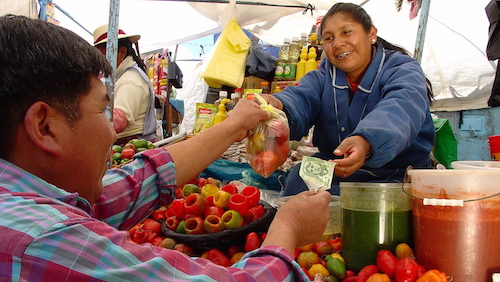
Image credit: Pro Mujer
WDI welcomes Maria Cavalcanti, president and CEO of Pro Mujer – a nonprofit finance organization that has disbursed more than $3 billion in loans to mainly women-owned enterprises in Latin America – to its Global Impact Speaker Series at the University of Michigan next month.
Cavalcanti will discuss Pro Mujer’s business model, which is centered on gender equity, and take questions from attendees beginning at 5:30 p.m., Nov. 15 in room 1560 of Blau Hall at the Ross School of Business. The event is free and open to the public.
Pro Mujer was founded by Lynne Patterson and Carmen Velasco in Bolivia in 1990 to use microloans to support women-owned businesses. Today, the organization works with entrepreneurs in that country as well as Argentina, México, Nicaragua and Peru. In 2015 alone, Pro Mujer reported providing $330 million in loans to more than 250,000 clients. Operating mainly in urban areas and regions just outside major cities, Pro Mujer also provides direct and indirect health care services through a series of centers and clinics. Services include non-communicable disease detection, dental care and ultrasound diagnostics.
 In early 2016, Cavalcanti (pictured left) was named president and CEO of Pro Mujer. She has ambitious plans to expand the organization.
In early 2016, Cavalcanti (pictured left) was named president and CEO of Pro Mujer. She has ambitious plans to expand the organization.
“As we look ahead, we are focused on amplifying our services and expanding our footprint,” Cavalcanti said in an interview with NextBillion.net, WDI’s affiliated media site focused on business solutions in low- and middle-income economies. “By leveraging partnerships and technology, we are building Pro Mujer as a platform capable of serving millions at a time; a one-stop shop for empowerment for women in the region.”
Cavalcanti holds an MBA from the University of Texas in Austin, a master of science in Information Science from Columbia University in New York, and a bachelor of arts from Universidade Federal do Ceará in Brazil. She is based in New York City, where Pro Mujer is headquartered.
Nobel laureate Sir Angus Deaton talked about poverty and what role NGOs, governments and the private sector should play in order to alleviate it during an Oct. 5 event that was the culmination of WDI’s year-long celebration of its 25th anniversary.
Deaton’s talk, held in the Robertson Auditorium at the University of Michigan’s Ross School of Business, reflected much of his study of the role global development aid may have had in exacerbating problems related to poverty rather than reducing them.
In 1980, Deaton noted, there were 2 billion people living in poverty. By 2012, that number was less than a billion.
“Nothing like this has ever happened in human history before,” he said.
Free, or at least freer, markets are a reason for this reduction in the number of people living in poverty. Likewise, globalization and technical change was vital as well.
“Without globalization, this enormous improvement in world poverty just would not have happened,” Deaton said.
Economists calculate that poverty could be eliminated if every adult in Europe and the U.S. donated about 30 cents a day. But people aren’t stepping up to help. Deaton said some posit that’s because people don’t want to or just don’t care. But he said his view and that of most economists is that “we do care, but we’re thinking about it wrongly.”
Deaton also said he believes the key that is holding poverty efforts back is politics and governance. He said if government is not working for the people, it won’t help raise them out of poverty.
People “need to help to the extent we can,” Deaton said. “But is aid effective?”
Deaton argues that aid is undermining the creation of institutions that are required for development. He said non-governmental organizations, or NGOs, are motivated by reducing poverty. But if the government is an extractive one, that is – taking money meant for aid for other purposes, “it’s very hard to see what NGOs can do about it.”
The private sector, however, has been a key to reducing global poverty, Deaton said. Another positive factor has been knowledge transfer, such as U.S. business schools that have exported entrepreneurship curriculum and training around the world.
The problem of development “is largely one of government failure and of extractive institutions,” Deaton said.
Businesses, he said, have a strong interest in making governments work better for the people.
After his remarks, WDI President Paul Clyde led a panel discussion about global poverty with Deaton, Renuka Gadde, vice president-Global Health at Becton Dickinson, David Lam, research professor at the U-M Institute for Social Research and Jan Svejnar, professor of Global Political Economy and director of the Center on Global Economic Governance at Columbia University.
Before Deaton spoke, U-M President Mark Schlissel recognized WDI’s anniversary and Bill Davidson’s vision back in 1992.
“He recognized that the private sector had to play a part in helping countries transition their economies to the free market,” he said.
Schlissel said he regrets never meeting Davidson but has heard “many wonderful things about him.” He said if Davidson were in attendance today, he would “tell him how proud we are that he made all of this possible.”
In introducing Schlissel, Ross School of Business Dean Scott DeRue said WDI’s and U-M’s vision are closely aligned. In addition to making U-M a thought and education leader, De Rue said Schlissel wants “the university to serve society and really engage with society in meaningful ways to elevate our impact in the state of Michigan, the United States and across the world.”
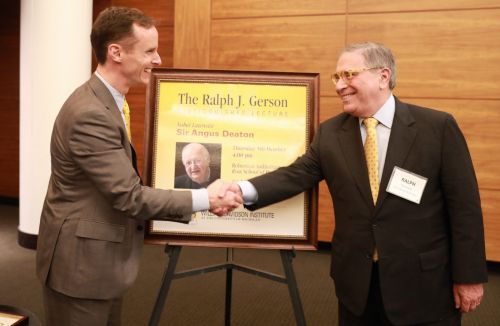
Ross Business School Dean Scott DeRue (left) shakes hands with WDI Board Member Ralph Gerson, for whom the new lecture series honors.
At its 25th anniversary celebration dinner Oct. 5, WDI announced the establishment of a new lecture series named in honor of the Institute’s longest-serving board member.
The Ralph J. Gerson Distinguished Lecture will take place every two to three years to “bring together our community and think about what is going on in the world and what we can do” about it, said Ross School of Business Dean Scott DeRue.
Gerson, a longtime Guardian Industries senior executive, has been involved in WDI since its founding in 1992, was an inaugural board member and continues to serve today.
“This is truly a great honor to be recognized in this way,” Gerson said. “I was not expecting this, but am so appreciative to have this lecture series in my name. For me, serving on the WDI Board with such able colleagues has been a great privilege. I have been a part of the Institute from the start because I believe deeply in its mission, in what it is trying to accomplish around the world, and to ensure WDI stays true to Bill Davidson’s vision today and into the future.”
The Oct. 5 talk by Sir Angus Deaton in the Ross School’s Robertson Auditorium was officially named the first Gerson lecture. Afterwards, invited guests which included University of Michigan President Mark Schlissel, Michigan Gov. Rick Snyder, Congresswoman Debbie Dingell and former U.S. Sen. Carl Levin, attended the dinner.
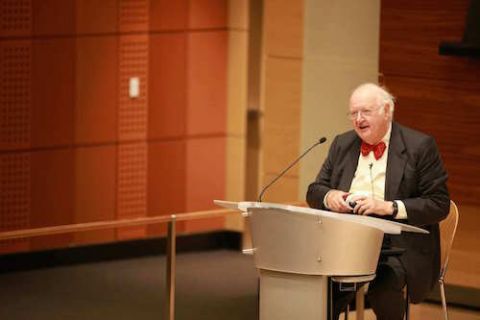
Sir Angus Deaton discusses poverty alleviation Oct. 5 at the first Gerson Lecture.
He said WDI had a transformative effect at Ross and across the University, giving students a new perspective and “an opportunity to understand that we’re living in a global world, that there’s a social impact that can be done.”
Snyder said when he steps back, he can say that Ross “is a far better place today because of this Institute being created.”
DeRue said the dinner and celebration, held in the school’s Colloquium, was very special. It was an opportunity, he said, “to honor Bill Davidson and his vision for what he imagined for the Institute.”
Gerson noted that Levin was present at the kickoff event for the Institute back in 1992 and was pleased to see him at the 25th anniversary commemoration. On behalf of the Davidson family, he thanked everyone for coming and sharing in the festivities.
“Bill Davidson believed in developing market-based economies,” Gerson said. “He believed in helping people by giving them the tools they need to help themselves.”
He said in 1992 there was a “tremendous hunger” to learn what was needed to succeed in a market economy. That hunger continues today, Gerson said.
“Bill intended WDI to function more as an economic accelerator than as a think tank,” he said. “I think he would be so pleased by all the business, economics, public health, law and many other students from across the university and the practitioners outside the academic world who have been touched and helped by WDI’s programs since 1992.”

At a special reception Oct. 5, Michigan Gov. Rick Snyder said as proud U-M alumnus he has been a fan of WDI since its founding.
Gerson referenced a video tribute to Davidson that was presented during the dinner in which Davidson’s son, Ethan, said his succinct father would sum up the Institute’s first 25 years by saying, “Well done.” Gerson said Davidson also would have probably added: “What’s next?”
“As we anticipate the next 25 years at WDI, I know the Davidson family will continue to stand behind the Institute,” he said. “We hope the Institute will continue to provide meaningful educational experiences in emerging markets both for U-M students and for firms around the world. Many of today’s students want to use their knowledge to either join or even create a firm designed to improve the lives of those living in low- and middle-income countries around the world.”
Gerson thanked DeRue, the WDI Board and staff and those at the university “for all the work you do to make Bill’s vision of progress a reality today.”
WDI has marked its 25th anniversary with a video that celebrates its history while also chronicling the important work it continues to do around the world. The Institute also produced a short, biographical video of the life of WDI founder Bill Davidson.
The six-minute video about the Institute features on-camera interviews with Bill Davidson’s son, Ethan Davidson, WDI Board Member Ralph Gerson, former U-M business school dean B. Joseph White and WDI President Paul Clyde. As Gerson said in the video, WDI’s 25th anniversary is an appropriate time to “reflect on what’s been accomplished” and to honor the impactful work performed globally by the Institute’s staff, faculty affiliates and student fellows.
Two of the many long-term projects that WDI has worked on – the Goldman Sachs 10,000 Women initiative in Rwanda and the Aravind Eye Care System in India – are featured in the video.
To honor the Institute’s founder, WDI looked back at Davidson’s life – from childhood to his successful business career and sports team ownership to his noted philanthropic contributions. Davidson was raised in Detroit and graduated from U-M, where he was a member of the track team. He earned a law degree from Wayne State University and after a few years as an attorney took over the family’s struggling glass business.
He turned Guardian Glass into one of the world’s largest glass manufacturing companies, today known as Guardian Industries. He also became one of Michigan’s biggest philanthropists, giving to causes in Detroit, at U-M, throughout southeast Michigan, and Israel. His charitable giving lives on through the William Davidson Foundation.
Davidson also was well known as the longtime owner of the Detroit Pistons basketball team, as well as the Detroit Shock of the WNBA and the NHL’s Tampa Bay Lightning.
WDI today unveiled a new book for its 25th anniversary that commemorates the Institute’s history, leaders, partners and inspiring work around the world.
 The book, “A Force for Economic and Social Freedom,” recounts the Institute’s founding and the dynamic life of its founder, Bill Davidson. The book also looks at the four people who have led WDI during its 25 years, and how each shaped the Institute in their own unique way.
The book, “A Force for Economic and Social Freedom,” recounts the Institute’s founding and the dynamic life of its founder, Bill Davidson. The book also looks at the four people who have led WDI during its 25 years, and how each shaped the Institute in their own unique way.
Four of WDI’s initiatives – Education, Healthcare, Performance Measurement and Scaling Impact – are profiled, including the goals of each and examples of some of their successful work.
The book also reflects on WDI’s 25-year engagement with the University of Michigan community – its faculty and students. Some of the Institute’s many collaborations with U-M faculty are featured, as are the numerous global internships and MBA student teams that WDI has sponsored over the years. The uplifting stories of several past WDI interns and how the opportunity to work abroad changed their lives, also can be found in the book.
The WDI Global Impact Speaker Series is discussed in the book, as well as two specialty areas of the Institute – case publisher WDI Publishing and the news and analysis site NextBillion.
The book concludes with a look to the future, and what the next 25 years and beyond hold for WDI.
The Institute received design and editorial assistance for the book from Michigan Creative, U-M’s in-house agency. Click here to download an electronic version of the book.
WDI’s Performance Measurement Initiative (PMI) specializes in:
PMI’s extensive portfolio of projects includes work with private sector, non-profit, and government partners and has taken place across many regions and industries. For more information on PMI, please see the PMI Capability Statement below.
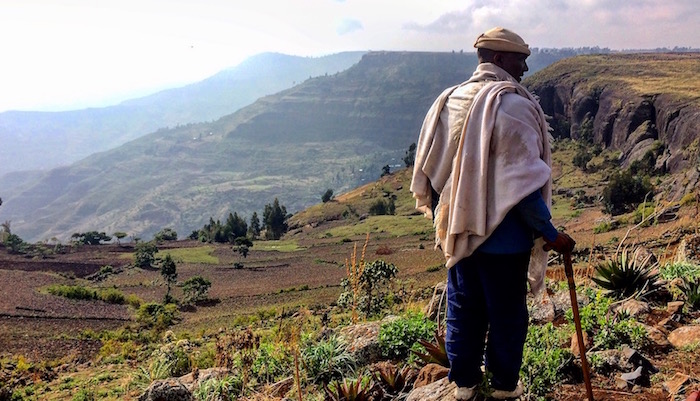
An Ethiopian farmer. (Images by Julia Entwistle).
Note: Julia Entwistle is a graduate student at the University of Michigan’s School for Environment and Sustainability, and this past summer was one of six WDI Global Impact interns placed with businesses and nonprofits around the world. Entwistle worked with the leadership at ADHENO, a non-profit focused on extreme poverty in Ethiopia. Her assignment involved conducting an impact evaluation of ADHENO’s environmental restoration and economic empowerment programs in the Northern Shewa province of Ethiopia. The organization sought the evaluation before rolling out its programs to additional rural sub-districts in Ethiopia. Entwistle worked with WDI’s Performance Measurement Initiative to develop a survey she implemented during her internship.
In the following article, originally published on NextBillion.net – an affiliated media site of WDI – Entwistle chronicles her specific work with ADHENO as well as explaining how profit-based solutions to environmental stewardship can be implemented.
By Julia Entwistle
Managing the economic interests of farmers and the environment is never an easy balance, regardless of where you are in the world. But perhaps nowhere is finding that equilibrium more difficult than Ethiopia. The UN Food and Agriculture Organization notes that about 12 million smallholder farming households account for an estimated 95 percent of agricultural production and 85 percent of all employment in the East African country, which has a total population of more than 100 million.
As a Global Impact intern at the William Davidson Institute (WDI), I spent the summer working with an Ethiopian nonprofit organization. ADHENO (which translates to Integrated Rural Development Association) implements environmental restoration and economic empowerment programs in the North Shewa region. . ADHENO’s work includes training for smallholder farmers on environmentally sustainable management practices such as terracing, use of improved seeds, water run off mitigation and intercropping. Much of ADHENO’s environmental restoration work is aimed at reducing the rate of erosion. Loss of soil matter and nutrients due to heavy rains and steep slopes in the region is a major concern for farmers. Another key program that ADHENO operates is called tree gudifecha. Gudifecha, meaning adoption in Amharic, is an afforestation program where farmers are paid to adopt and care for trees.
These Ethiopian farmers are not exempt from the underlying conflict that challenges most sustainability efforts, balancing the well-being of the environment with economic interests. The farmers are increasingly turning to chemical pesticides and herbicides to maintain crop yields on their increasingly degraded soils. This reliance on synthetic additives only digs these farmers into a bleaker situation as money is spent on the herbicides, which further degrade the soil. Additionally, these chemical additives have another unintended consequence that further jeopardizes the ecosystem as well as crop yields, killing the bees that are needed to pollinate the crops. In Ethiopia, use of herbicides as well as loss of habitat are causing a reduction in the local pollinator population, not unlike the global trend of pollinator decline that is threatening food security around the world. Fewer bees mean decreased crop productivity with yields cut by 12 percent to 36 percent for various crops, according to an FAO report in 2006.
Although ADHENO discourages the use of chemical herbicides, the organization has put forth an effort to restore the pollinator population by appealing to economic incentives. Indigenous species such as acacia and cordia trees are prime pollinator habitat, but provide little utility in terms of a return for a farmer. Alternatively, much of the rural populace can turn a profit from growing eucalyptus trees, which are harvested for use in construction. Although valuable, the eucalyptus tree is native to Australia and therefore does not support native pollinators. As part of ADHENO’s tree adoption program, farmers are paid a small amount of money to plant and care for trees. Of course, eucalyptus is the most desired tree for planting, but for every eucalyptus seedling that ADHENO provides, the farmers must also care for an indigenous tree to serve as bee forage. Through this strategy over 1 million trees have been adopted since the program’s inception in 2008.
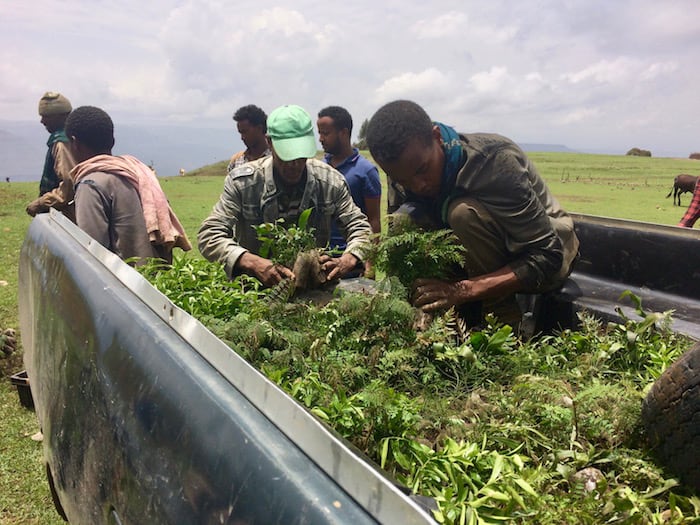
At an ADHENO tree nursery.
In addition to restoring pollinator habitat, ADHENO also encourages the adoption of bee hives as both a way to bolster the pollinator population and create an additional source of income for farmers. Through outside funding sources, ADHENO helped establish a honey cooperative. Initial funds supported the construction of a honey processing plant, covered registration fees and provided for training on how to safely harvest, process and package honey. Since the initial donation of startup funds, the co-op has been self-sustaining and functions like any other cooperative. The farmers sell their honey to the co-op, and the co-op sells the honey at a fixed price. The farmers then receive the profits from their honey sales, which are divided proportionally among the members based on how much honey they contributed. This organization provides a platform for the farmers to profit in a more organized and sustainable way.
The co-op also allows the farmers to package their product and access a wider market than they would otherwise be able to. A downside to this business strategy is that since the co-op sells honey at a fixed price, the profits received by the farmers are not responsive to fluctuations in the market price of honey. For this reason, the co-op forbids private sales for its members, in other words, to be a member of the co-op, farmers have to agree to sell all of their honey to the co-op, even if the market price is higher than the co-op’s fixed price. On the other hand this model guarantees some income for the farmers even if the market price for honey is below the fixed price.
It is also a goal of the co-op to encourage farmers to take up beekeeping. Senior co-op members conduct trainings with new and prospective members on keeping bees and harvesting honey. The co-op currently has more than 400 members.
My work with ADHENO is conducting an impact evaluation to determine what effect ADHENO’s programs, including beekeeping, farmer training and tree plantings, are having on the livelihoods of rural farmers. Along with other students from the University of Michigan’s School for Environment and Sustainability, we are evaluating both the ecological and economic impact of these programs. While our analysis of the data collected this summer is ongoing and we hope to have a final report of the results by the end of the year, we do know that ADHENO has certainly demonstrated innovative ways to advance the needs of farmers and the environment.
Meanwhile, ADHENO is planning to expand its programs to several additional rural communities in the North Shewa region and hope to use our evaluation to guide its growth for maximum impact.
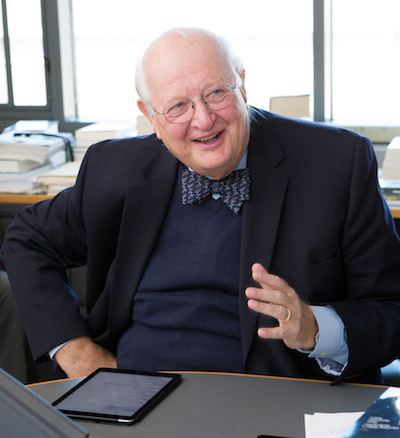
Angus Deaton. (Image credit: Princeton University).
The William Davidson Institute at the University of Michigan will host an Oct. 5 talk and discussion with Sir Angus Deaton, a Nobel Prize-winning economist whose work has changed how many think about both global wealth and poverty.
The event, which is free and open to the public, will take place at 4 p.m. in Robertson Auditorium at U-M’s Ross School of Business. A panel discussion will follow Deaton’s talk, which is titled “What Should We Do About Global Poverty?” The event is part of WDI’s year-long celebration of its 25th anniversary. The panel discussion will include Renuka Gadde, vice president-Global Health at Becton Dickinson; David Lam, research professor at the U-M Institute for Social Research; and Jan Svejnar, professor of Global Political Economy and director of the Center on Global Economic Governance at Columbia University.
Deaton is the Senior Scholar and Dwight D. Eisenhower Professor of Economics, and International Affairs Emeritus at the Woodrow Wilson School of Public and International Affairs in the Economics Department at Princeton University. His research includes work on poverty, inequality, health, well-being, economic development, and randomized controlled trials.
He received the Nobel prize in 2015 for his research into how the consumption of goods and services plays a critical role in human welfare. In 2016, Deaton, a native of Scotland, was knighted by Queen Elizabeth II for his service in the fields of economics and international affairs.
Perhaps the best summary of his work on economic health and development is his 2013 book, The Great Escape: Health, Wealth, and the Origins of Inequality. The book carefully documents the remarkable progress in income and health that has taken place, especially over the past 50 years. Despite large-scale increases in income around the world that have pulled millions of people out of poverty, Deaton details why gaping inequality remains, both between and within nations. That inequality, decades if not centuries in the making, can be understood not only by poring over economic data, but also pairing economic research with health data. For instance, Deaton looks at metrics such as the height of women from many countries over the course of decades as a key marker of economic progress.
The book also explores how global development aid may have exacerbated problems relating to poverty rather than reducing them. Deaton’s book combines respect for the progress made with an open questioning of gaps in the progress and efforts to address those gaps. He gives suggestions on how the global economy can engage those displaced and left behind by reforming incentives to companies and lifting trade restrictions in the developing world.
“Professor Deaton is an outstanding economist whose careful research and empirical methods have informed and challenged our thinking around global health and poverty in low- and middle-income countries. He doesn’t accept easy answers and carefully assesses what works and what doesn’t work,” said WDI President Paul Clyde. “Deaton’s thinking is very relevant to WDI’s mission and we’re honored he can join us for our 25th anniversary event. We’re looking forward to his speech and a lively discussion that will be illuminating for students, faculty, and anyone interested the development of low- and middle-income countries.”